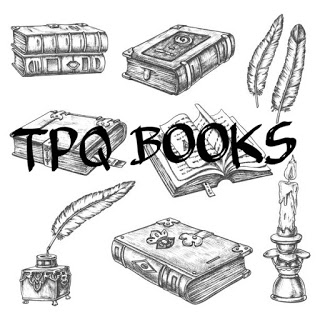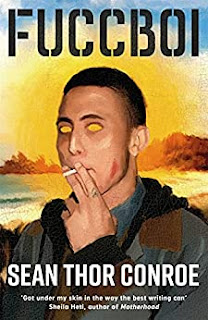 Christopher Owens 🔖 Controversy isn’t what it used to be.
Christopher Owens 🔖 Controversy isn’t what it used to be.Once upon a time, books had the power to threaten cultural stability (The Satanic Verses), be vilified by the same people being commented upon (American Psycho) and face obscenity battles (Last Exit to Brooklyn). Nowadays, they barely register in the national conscience.
So, when a book of fiction comes out with a hint of controversy surrounding it, I’m automatically interested. And when it involves an implied culture clash between the indies and major, the interest grows.
Published in January, Fuccboi has garnered a fair amount of acclaim from publications like The Irish Times and the Wall Street Journal. The publisher describes it as an “… audacious, freewheeling debut …” which sees:
… our eponymous fuccboi, Sean, as he attempts to live meaningfully in a world that doesn’t seem to need him. Reconciling past, failed selves — cross-country walker, SoundCloud rapper, weed farmer — he now finds himself back in his college city, trying to write, doing stimulant-fuelled bike deliveries to eat. Unable to accept that his ex has dropped him, yet still engaged in all the same fuckery — being coy and spineless, dodging decisions, maintaining a rotation of baes — that led to her leaving in the first place. But now Sean has begun to wonder, how sustainable is this mode? How much fuckery is too much fuckery?
Have to admit, this premise doesn’t sound particularly intriguing. However, allegations of plagiarism and fraudulent imagery from writer Sam Pink preceded the book’s publication. In a vitriolic blog post, he wrote that:
Fuccboi is a complete rip off of my style. This isn’t even a debate. He has admitted it himself and every person I talk to about it agrees, even people close to/supporting him. In fact the person who showed Sean my writing actually contacted me about it, empathizing. Not a single person disagrees…He does a thing where he pays lip service to indie writing, writing ‘for the people’ ‘for the culture’ etc, talks shit about ‘mfa fucks’ in Fuccboi, and shits on major publications, while pursuing those things on his own, fervently (in Fuccboi he is attempting to use a lukewarm romance with a woman who is a ‘high power editor’s’ assistant, to get his book published.) He even discusses it with his mom, after paying lip service to writers needing to be peoples’ champ types. He wants the glory bad, but none of the work. This is all part of a strange division within Sean’s thinking, which other people have noted to me, i.e, being full of shit.
Predictably, this led to a backlash in the indie writing world. However, one Twitter user made a point that, for some, gets to the real heart of the matter: “If Fuccboi had been released on an indie press all the butt hurt hater dudes would be riding its dick right now on Goodreads.”
Ouch!
So, after all that, is the book worthwhile?
Not really.
It attempts to offer up a bland existence of moving between flats, partners, being sick and working as a delivery driver as a commentary on the youth and masculinity in 21st century America. I suspect that Conroe would make the argument that the blandness is the commentary as it demonstrates how repetitive, mechanised and commodified our lives have become, therefore we fill the void with discussions on identity, gender and status. While this is an admirable goal, unfortunately, Conroe has neither the withering insight nor the imagination or wit to make it an enthralling read.
It also doesn’t help that the book reads like a series of blog posts stuck together with a writing style, mixing modern vernacular as well as academic quotes and minimalism which gets irritating very quickly, with the numerous uses of the word “bae”, “boo”, “homie”, “redpill” and “woke” constantly reminding the reader that This Is The Voice Of Youth, So Get With It Grandad.
Take the following paragraph as an example:
Ex-roomie bro pulling up at some point, speaking over me when I explained my side, speaking directly to the women present like I wasn’t there, like apologising collectively for our gender, me getting in his face like Talk to me myself ya got something to say you bitch, you virtuesignalling fuck. Then autonomous bae mad at me all night, even when she came back with and fucked me, going You’re so trash, you’re terrible, but either that fact (my trashness), or the power she felt saying it, or that she thought it but was fucking me anyway making her wetter.
Or this:
Dude, I don’t give a shit about MFA programs. I’m not interested in writing for people who already read. Who consider themselves ‘literary’. More ‘literature’ means more insulated, masturbatory bullshit completely irrelevant to the culture. I’m tryna write for people who don’t read. Who don’t give a shit about books.
The voice of disaffected American youth, eh?
Truth be told, it’s not the worst read in the world. At times, the narrator can make the odd quip that will make the reader smile (usually it revolves around delivery driver issues) and, once you adopt your mindset to that of someone in their mid-20’s, the book becomes an untaxing, minimalist read. However, as a grand statement about youth and young manhood, it falls flat. Telling us nothing about the current cultural impasse, a narrator who’s more of a NPC than the author would care to admit, a non-existent plot and nothing memorable for the reader to latch onto, Fuccboi is a bland soup of nothingness offered up as social commentary.
The youth are revolting.
Sean Thor Conroe, 2022, Fuccboi. Wildfire. ISBN-13: 978-1472293107
⏩ Christopher Owens was a reviewer for Metal Ireland and finds time to study the history and inherent contradictions of Ireland. He is currently the TPQ Friday columnist.





Very interesting review. This observation "we fill the void with discussions on identity, gender and status" stuck out. And there's a ground-breaking novel to be written about this subject - but I wonder if the TikTok generation (which alas is cross-generational) have the collective attention span to conceive, write, widely read, and debate such a work. This review made me situate (perhaps) Fuccboi in a similar category Elizabeth Wurtzel's later authobiographical work - a self-involved protagonist keen to posit their life in a culturally relevant frame.
ReplyDeleteBrandon,
Deletethanks for the kind reply.
There undoubtedly is the potential, and it is one that will come from the independent sector. I can't see many (if any) mainstream authors tackling the subject for fear of being cancelled (look at Rosemary Jenkinson and Jeanine Cummins for recent, unconnected examples).
I think they will, but the ones who need to read such books never do. C'est la vie.
That's not a bad comparison, although Prozac Nation is a genuinely compelling read.
Prozac Nation is an incredible book. She probably should have just left it there, though. Or just stuck to journalism. Still, an intriguing person. I wonder if a book like Prozac Nation would gain much of an audience now-a-days. It was literary and masterfully written, but the subject matter was/is standard Tumblr fare.
ReplyDeleteI think, with an ego that gargantuous, there was little chance of her quietly retreating into journalism. As I wrote in my review of PN: "The irony of seeing someone who, inadvertently, predated internet culture with her willingness to be so open being consigned to the skip marked "Gen X - pre dial up" is hard to miss. No matter how ground breaking you are, subsequent generations only see you as an old bastard." There was no way she would take irrelevance well.
DeleteI think it would still gain an audience nowadays, since misery lit is seemingly more popular now than ever, although I think there'd be discussions on how "problematic" some of her behaviour is.
Another excellent review Christopher - and one that makes me feel that the book is no where near as good as the review is. Did you find the debate around it - plagiarism accusations and such like - more gripping then the book itself?
ReplyDeleteAM,
Deleteyes and no. Accusations of plagiarism are ten a penny in the arts (hence the saying 'where there's a hit, there's a writ') but what made this different (to me) was the insinuation that Conroe had used the indie publishing world to gain a foothold in the mainstream. Coupled with the subject matter, it seemed like this could be A Literary Moment. But it wasn't.
There's a good article on Unherd about the book, with the journalist arguing that Conroe is trying to reach for something pertaining to literary greatness but is held back by modern writing tropes.
https://unherd.com/2022/02/has-fuccboi-killed-literature/